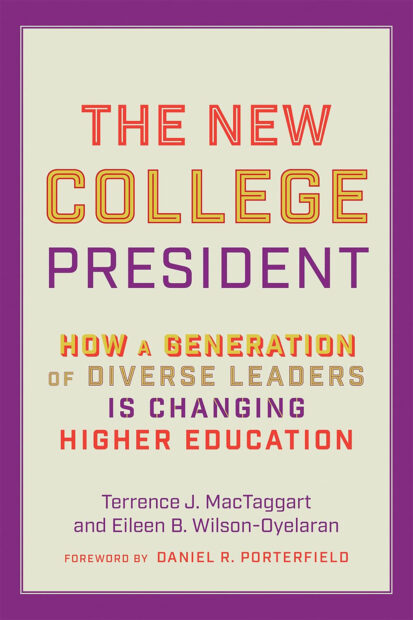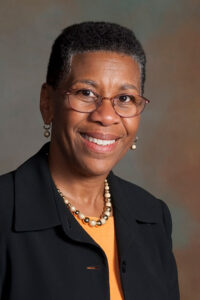At a moment when college leaders are navigating choppy seas, Eileen Wilson-Oyelaran ’69 has written a timely analysis of university leadership that outlines what it will take to lead higher education institutions effectively in the coming decade and beyond.
 The book, “The New College President: How a Generation of Diverse Leaders Is Changing Higher Education,” co-written with Terrence MacTaggart and published by the Johns Hopkins University Press, profiles seven university leaders and describes the skills and personal qualities they possess that have made them successful.
The book, “The New College President: How a Generation of Diverse Leaders Is Changing Higher Education,” co-written with Terrence MacTaggart and published by the Johns Hopkins University Press, profiles seven university leaders and describes the skills and personal qualities they possess that have made them successful.
Few are as qualified as Wilson-Oyelaran to opine on the topic. She served as president of Kalamazoo College from 2005 to 2016, a period that included a major economic recession, and also was named as chair of the board of directors of the National Association of Independent Colleges and Universities for the 2013-2014 academic year.
In the book, Wilson-Oyelaran discusses some of the major challenges facing the college and university presidency, among them high turnover rates, debilitating financial pressures and conflicting institutional strategies. For example, she says that presidents’ shorter terms may negatively impact institutions, since it generally takes time for presidents to understand school culture and garner the trust of their communities.
For Wilson-Oyelaran, that trust is more vital now than ever. “Colleges and universities are being asked to change more rapidly and more dynamically, but the ability to do that requires someone who is known and trusted, which takes time,” she says. “A leader who is embedded in the community is much more able to make the changes that are necessary right now.”
One quality that Wilson-Oyelaran and MacTaggart found in all the successful presidents they profiled was the significant adversity they faced. “Adversity gives you empathy and a great deal of resilience, which is of particular importance for leading institutions of higher education right now,” says Wilson-Oyelaran. “As the arrows get slung at you, it’s critical to be able to let them roll off and continue to move forward. You develop a sixth sense of how to keep focusing on what is of value and what to let go of.”
 During her years at Pomona, Wilson-Oyelaran was a galvanizing figure who was instrumental in creating The Claremont Colleges’ first Black Student Union in 1967 and the Black Studies Center in 1969. She says that she’s deeply encouraged by how her generation’s efforts transformed higher education, both in terms of what the student body looks like, and in the expanded breadth of the curriculum.
During her years at Pomona, Wilson-Oyelaran was a galvanizing figure who was instrumental in creating The Claremont Colleges’ first Black Student Union in 1967 and the Black Studies Center in 1969. She says that she’s deeply encouraged by how her generation’s efforts transformed higher education, both in terms of what the student body looks like, and in the expanded breadth of the curriculum.
“When I look at Pomona today, in many ways the institution represents what we hoped to see,” she says. “It’s pretty incredible to see how the field of African American studies has flourished nationally, and to feel that I maybe did a little bit to move that forward.”
